2017年中考一轮教材复习课件:七年级上册 Starter Units 1-4 & Units 1-4
文档属性
| 名称 | 2017年中考一轮教材复习课件:七年级上册 Starter Units 1-4 & Units 1-4 | 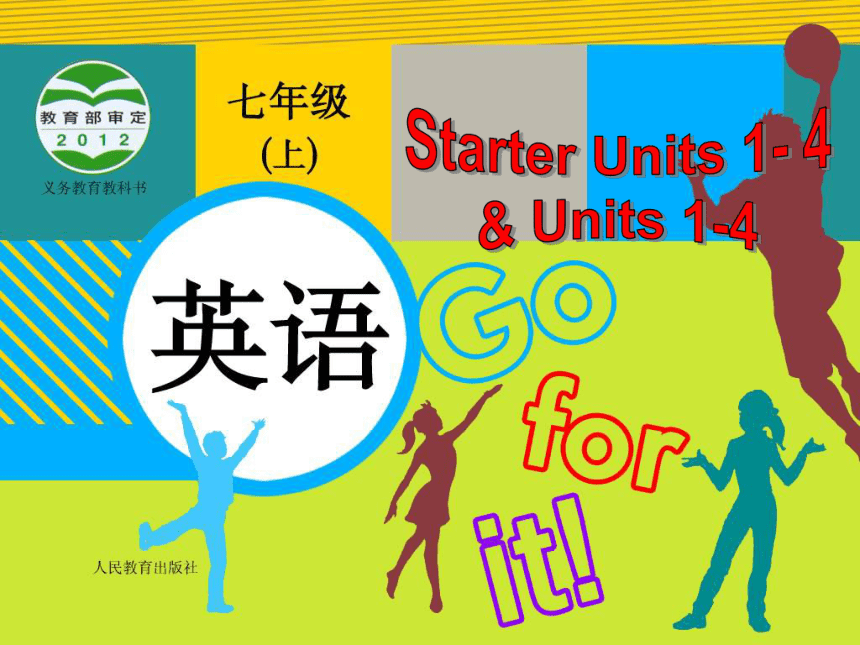 | |
| 格式 | zip | ||
| 文件大小 | 255.2KB | ||
| 资源类型 | 教案 | ||
| 版本资源 | 人教新目标(Go for it)版 | ||
| 科目 | 英语 | ||
| 更新时间 | 2017-01-07 22:06:01 | ||
图片预览

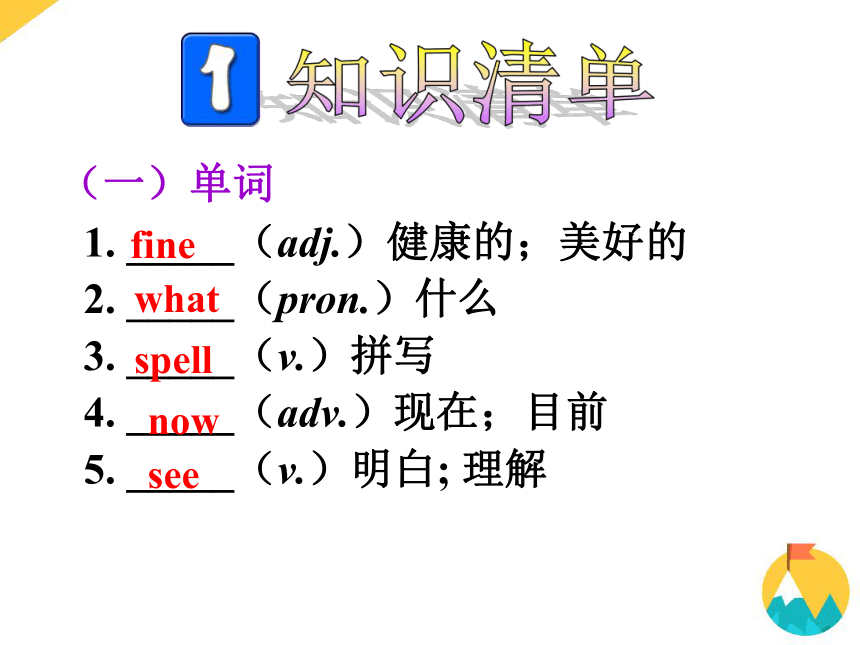
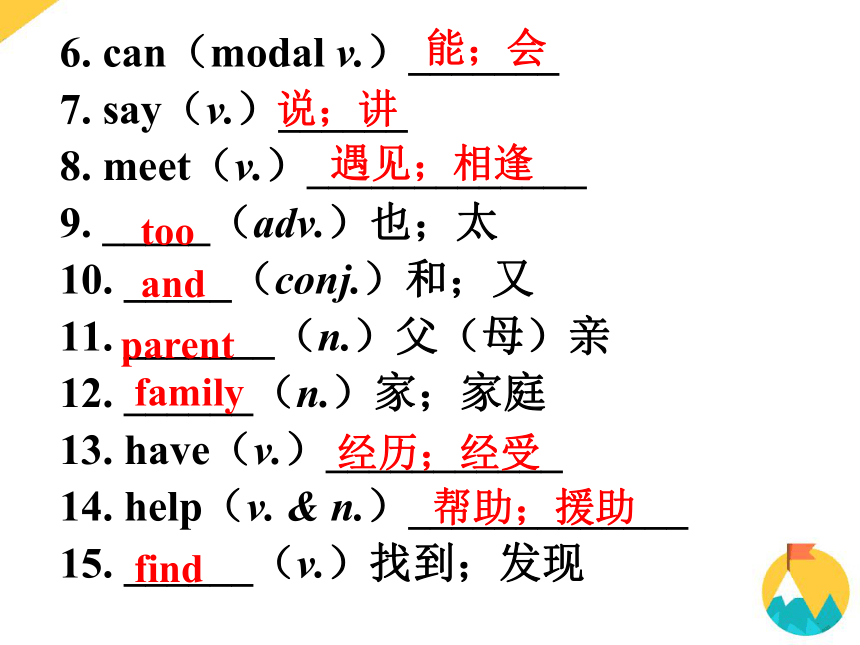
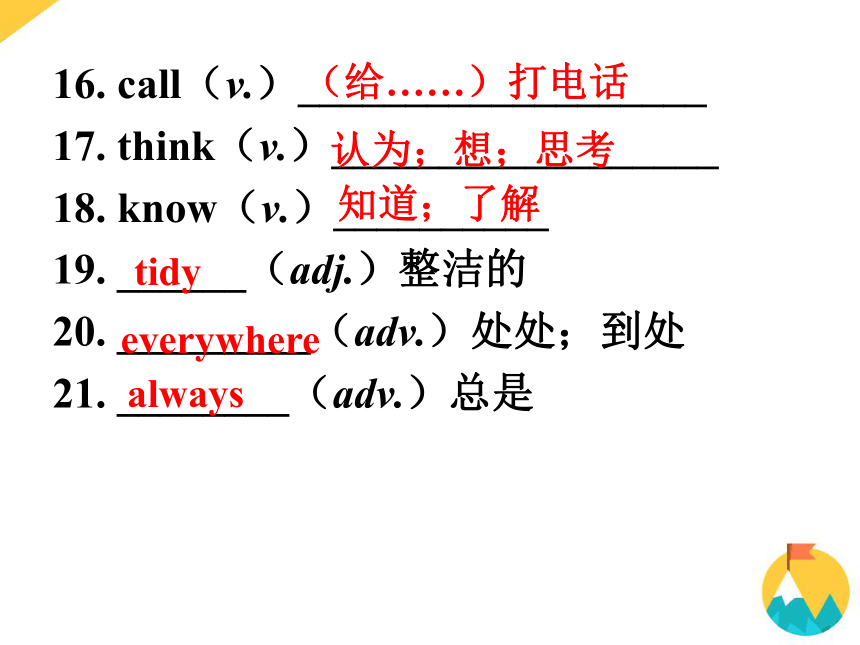
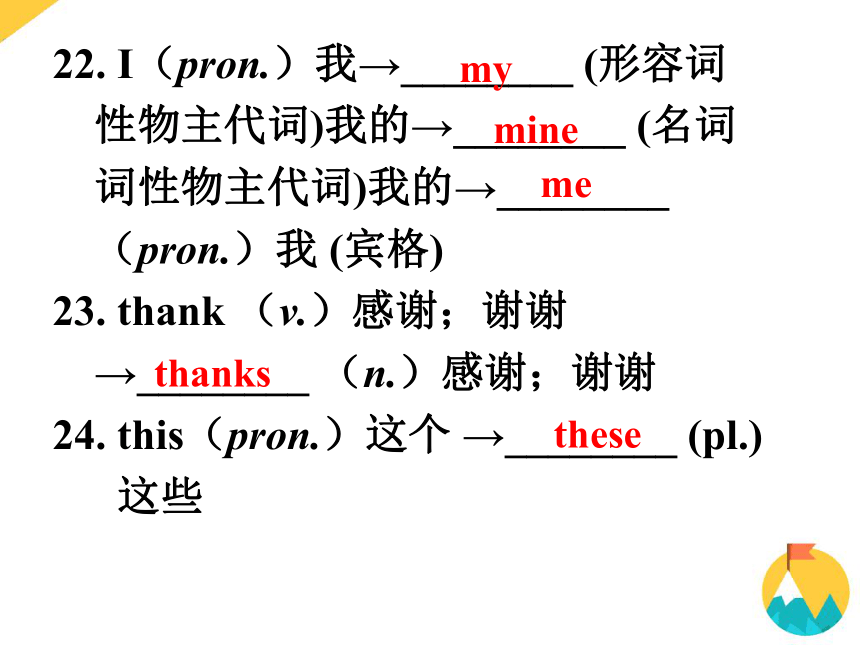
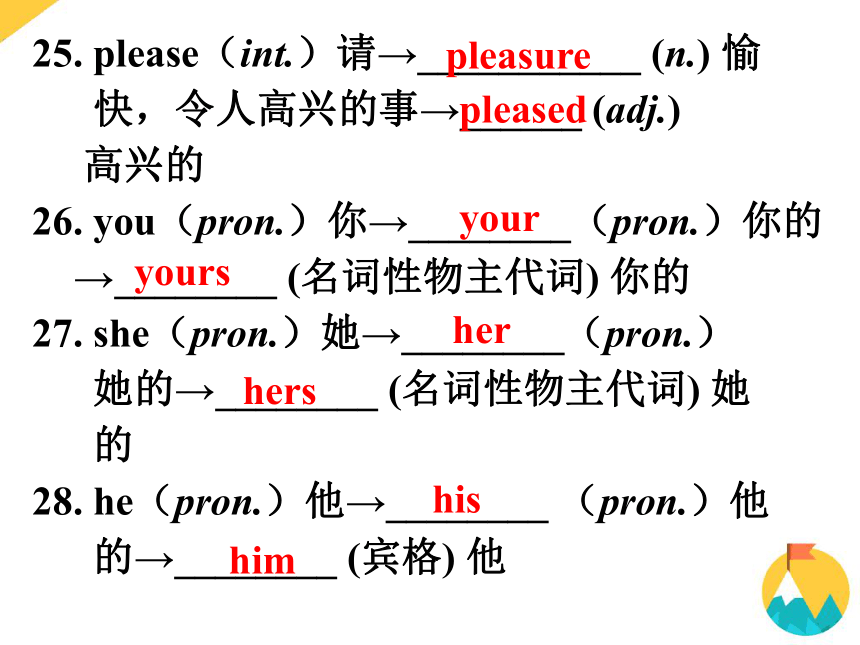
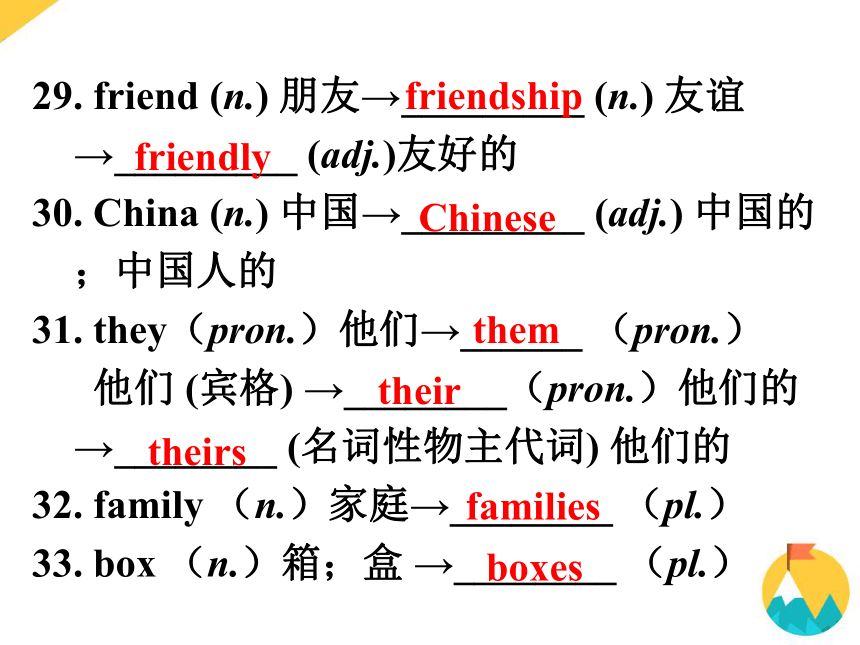
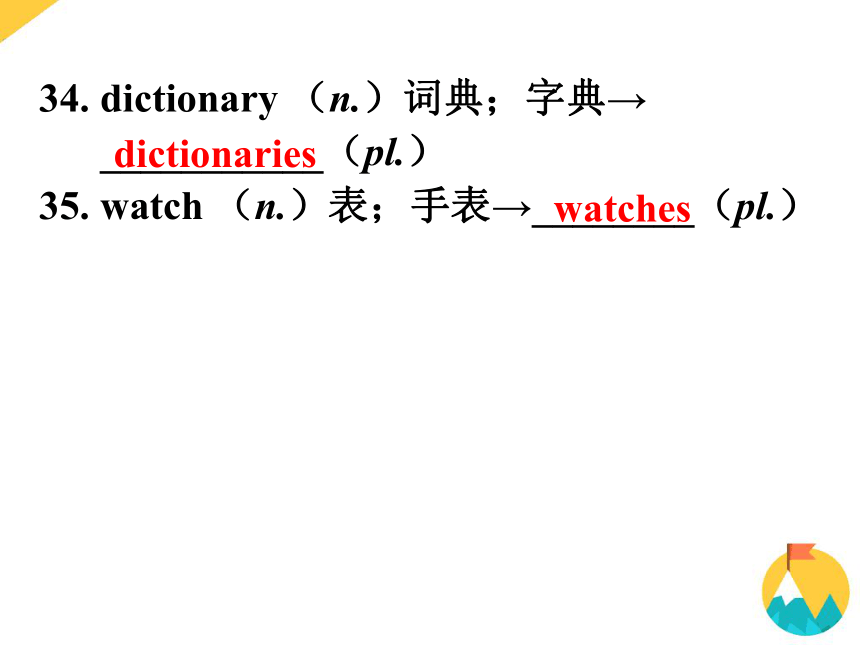
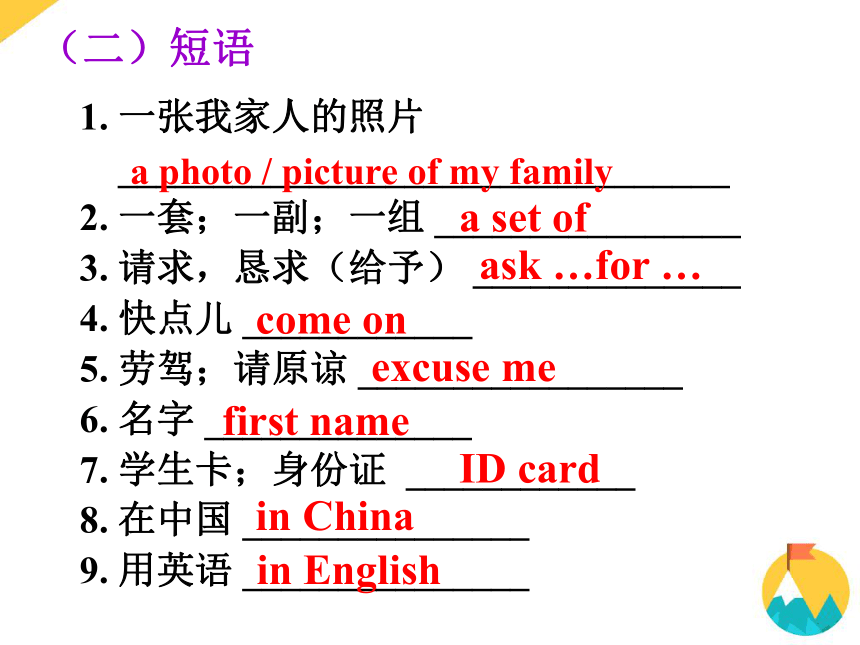
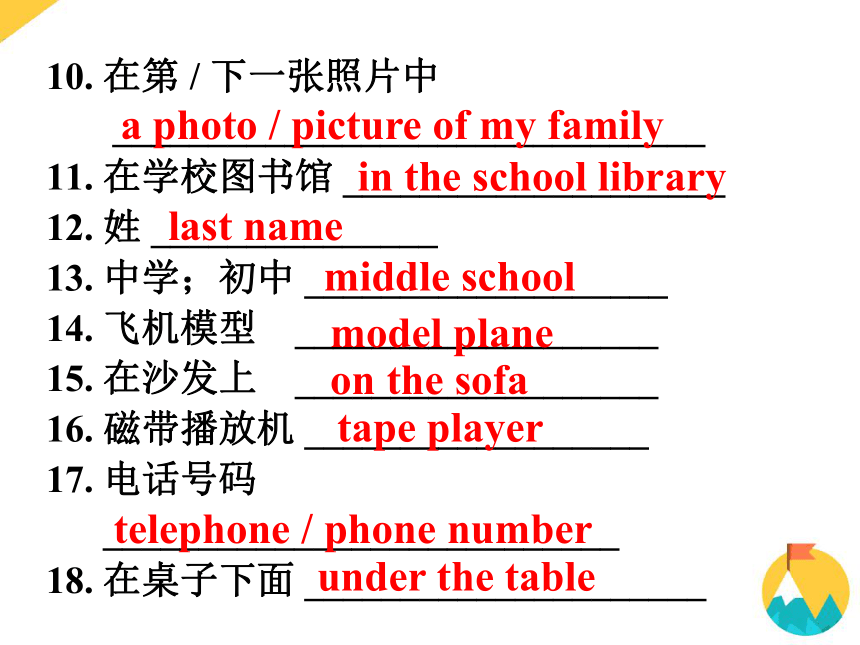
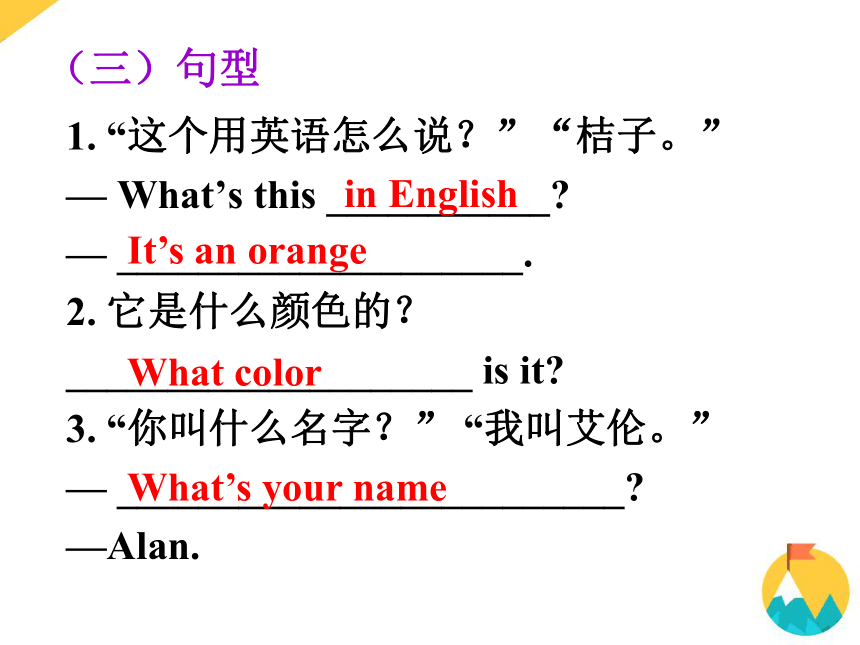
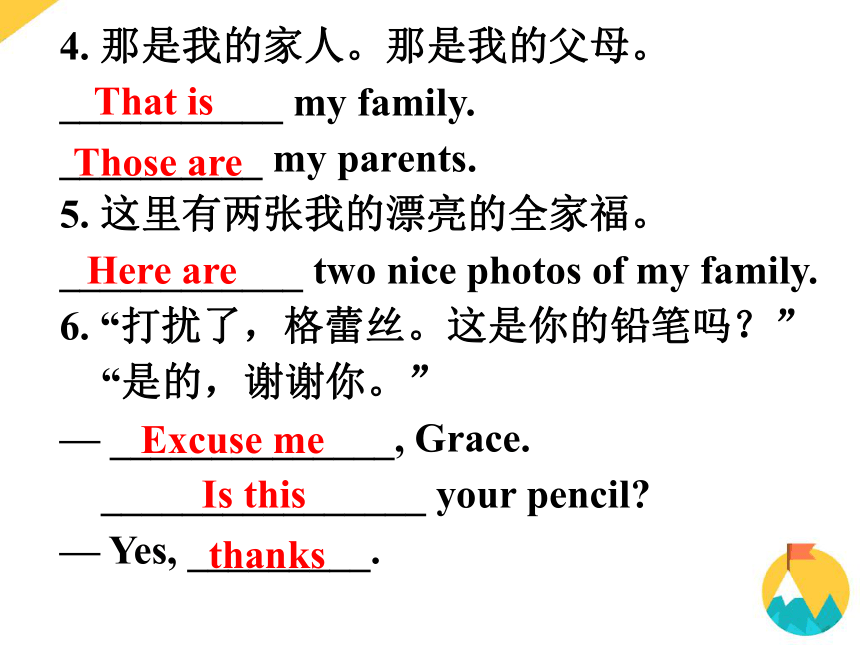
文档简介
课件59张PPT。Starter Units 1- 4
& Units 1-41. _____(adj.)健康的;美好的
2. _____(pron.)什么
3. _____(v.)拼写
4. _____(adv.)现在;目前
5. _____(v.)明白; 理解 finewhatspellnowsee(一)单词知识清单6. can(modal v.)_______
7. say(v.)______
8. meet(v.)_____________
9. _____(adv.)也;太
10. _____(conj.)和;又
11. _______(n.)父(母)亲
12. ______(n.)家;家庭
13. have(v.)___________
14. help(v. & n.)_____________
15. ______(v.)找到;发现 能;会说;讲遇见;相逢tooandparentfamily经历;经受find帮助;援助16. call(v.)___________________
17. think(v.)__________________
18. know(v.)__________
19. ______(adj.)整洁的
20. _________(adv.)处处;到处
21. ________(adv.)总是 (给……)打电话认为;想;思考知道;了解tidyeverywherealways22. I(pron.)我→________ (形容词性物主代词)我的→________ (名词词性物主代词)我的→________ (pron.)我 (宾格)
23. thank (v.)感谢;谢谢→________ (n.)感谢;谢谢
24. this(pron.)这个 →________ (pl.)
这些 myminemethanksthese25. please(int.)请→___________ (n.) 愉
快,令人高兴的事→______ (adj.)
高兴的
26. you(pron.)你→________(pron.)你的 →________ (名词性物主代词) 你的
27. she(pron.)她→________(pron.)
她的→________ (名词性物主代词) 她
的
28. he(pron.)他→________ (pron.)他
的→________ (宾格) 他youryourshisherhimherspleasurepleased29. friend (n.) 朋友→_________ (n.) 友谊→_________ (adj.)友好的
30. China (n.) 中国→_________ (adj.) 中国的;中国人的
31. they(pron.)他们→______ (pron.)
他们 (宾格) →________(pron.)他们的 →________ (名词性物主代词) 他们的
32. family (n.)家庭→________ (pl.)
33. box (n.)箱;盒 →________ (pl.) Chinesetheirsthemfamiliestheirfriendshipfriendlyboxes34. dictionary (n.)词典;字典→
___________(pl.)
35. watch (n.)表;手表→________(pl.) dictionarieswatches1. 一张我家人的照片
________________________________
2. 一套;一副;一组 ________________
3. 请求,恳求(给予) ______________
4. 快点儿 ____________
5. 劳驾;请原谅 _________________
6. 名字 ______________
7. 学生卡;身份证 ____________
8. 在中国 _______________
9. 用英语 _______________(二)短语 a photo / picture of my family a set ofask …for … come on excuse mefirst nameID card in Chinain English10. 在第 / 下一张照片中
_______________________________
11. 在学校图书馆 ____________________
12. 姓 _______________
13. 中学;初中 ___________________
14. 飞机模型??? ___________________
15. 在沙发上 ___________________
16. 磁带播放机 __________________
17. 电话号码 ___________________________
18. 在桌子下面 _____________________a photo / picture of my family in the school librarylast namemiddle school model planeon the sofatape playertelephone / phone numberunder the table1. “这个用英语怎么说?”“桔子。”
— What’s this ___________?
— ____________________.
2. 它是什么颜色的?
____________________ is it?
3. “你叫什么名字?” “我叫艾伦。”
— _________________________?
—Alan. (三)句型in EnglishIt’s an orangeWhat colorWhat’s your name4. 那是我的家人。那是我的父母。
___________ my family.
__________ my parents.
5. 这里有两张我的漂亮的全家福。
____________ two nice photos of my family.
6. “打扰了,格蕾丝。这是你的铅笔吗?” “是的,谢谢你。”
— ______________, Grace. ________________ your pencil?
— Yes, _________.That isThose areHere areExcuse meIs thisthanks7. “这些是你的书吗?” “不是,是她的。”
— ___________ your books?
— No, __________. ____________.
8. 这本词典(是谁的)呢?
____________________ this dictionary?
9. “安娜,谢谢你的帮助。”“不客气。”
— _____________________, Anna.
— You’re _________.Are thesethey aren’t They are hersWhat aboutThank you for your helpwelcome10. “他们的钥匙在哪里?” “它们在桌子上面。”
— ___________ their keys?
— __________ on the table.
11. 你怎样拼写它?
____________________ you spell it?
12. 拨打电话578-0931找我。
______________ 578-0931.Where areThey areHow doCall me at1. I can say my ABCs. 我会说ABC了。
say及物动词,意为“说”,后面必须跟宾语,强调“说”的内容。
e.g. Let’s go and say “Hello” to our new
friends.
我们去向我们的新朋友们问好。
【辨析】say / tell / talk / speak
say vt.说做“说”讲时,强调说的内容;还有
“(某处)写有”之意。核心要点 tell vt. 告诉、讲述强调讲给另人听。tell sb.
sth. 告诉某人某事;tell sb. (not) to do sth.
告诉某人(不要)做某事
talk vi. 谈话,交谈强调与某人交谈。talk
to/ with sb. 与……交谈;talk about sth. 谈
论某事
speak v. “讲话;发言”;指说话的能力。2. That’s my family. 那是我的家。
family 意为“家;家庭”,从人员角度谈
“家”。
e.g. Jim has a happy family.
吉姆有个幸福的家庭。
【辨析】family /home / house
family n. 家;家庭强调由家人组成的一个集
体或强调这个集体中的成员。
home n. 家园;家乡指的是家庭成员所在的地
方,多从感彩方面谈“家”、“家园”。house n. 家;房子多从“实物”方面谈“家”。指具体的建筑。
e.g. My?family?are?all?workers. ??
我的家人都有是工人。?
His?home?is?not?far?from?here. ??
他家离这儿不远。??
That?building?is?Jackson’s house.
那座楼房是杰克逊的房子。 3. —What’s that in English?
用英语说那是什么?
—It’s a jacket. 它是一件夹克衫。
it代词,意为“它”,在句中指代上文中的that。
e.g. I don’t like the soup. It’s too salty.
我们不喜欢这个汤,它太咸了。
【辨析】it /that / one
it、that、one三者均用作代词,指代上文出现的事物。但在用法却有所不同。
It ① it指代上文提到的事物时,为同名同物。 ② it还可以代替句中的不定式或从句
等,充当形式主语或宾语。
that ① that指代上文提到的事物时,为同
名异物,代替复数名词时用those。
② that表示特指,相当于“the+名词”。
one ① one指代上文提到的事物时,为同名
异物,代替复数名词时用ones。
② one表示特指,相当于“a/an+名词”。4. Thank you for your help. 谢谢你的帮助。
thank you for…=thanks for…,表示“因……表示感谢”,thanks是名词,thank动词。介词for后接名词或动词-ing形式。答语常为:
You’re welcome. 不客气;Not at all.不用谢
;That’s all right. 不用谢等。
—Thank you for your dictionary.
(=Thanks for your dictionary. )
谢谢你的字典。
—You’re welcome. 不客气。【拓展】thanks to
thanks to意为“由于,多亏”,其中to为介
词,后接名词或动名词。
e.g. Thanks to this map, we were able to
find our way out the forest.
多亏这张地图,我们才能够从森林中出
来。 5. Some keys are in Classroom 7E.
在7E教室里有一些钥匙。
some在本句作形容词,意为“一些;某些”。some还作代词,意为“有些;有的”。其后跟可数名词复数或不可数名词。
e.g. Some boys are reading in the classroom.
一些男孩们正在教室里读书。
Let’s have a rest and have some tea.
让我们休息一下,喝点茶。【辨析】some / any
some 一些;几个
①多用于肯定的陈述句中。②用在疑问句中表示希望得到肯定的回答或表示请求、建议、命令含义等。
any一些;任何
① 多用于否定句、疑问句中。②也可以用在肯定陈述句或条件状语从句中,表示“任何的”、“任何一个的”,其后接名词单数形式。There aren’t any pencils in the pencil box.
在铅笔盒里没有铅笔。
If there is any trouble, do let me know.
如果遇到什么麻烦,务必告诉我。6. I’m tidy, but Gina isn’t.
我很整洁,但是吉娜却不。
but连词,意为“但是”,表示转折关系。
e.g. He is very rich, but he isn’t happy.
他很富有,但是他并不幸福。
【辨析】but / and / or / so
but“但是”,表示转折关系。
and“和”,表示并列关系。三者或更多项
并列时,只在最后两项间加and。or ①“或者”,用于疑问句中表示选择。
②“和”,用于否定句中表示并列关系。
③“否则”,用于表示假设,相当于
if…not。
so“因此”,表示结果,不能和because同时
使用。人称代词、物主代词和指示代词??????
一、人称代词
1. 人称代词分为主格和宾格,有人称和数的变化。如:语法2. 人称代词的主格在句中充当主语。如:
She is a teacher.
人称代词的宾格在句中充当动词、介词的宾语或表语。如:
Do the children like them? (作动词的宾语)
The cake is for him. (作介词的宾语)
—Who is knocking at the door?
—It’s me. (作表语)二、物主代词
1. 物主代词分为形容词性物主代词和名词性物
主代词,也有人称和数的变化。如:2. 形容词性物主代词后面接名词,不单独使
用。如:
My parents are teachers.
3. 名词性物主代词后面不需要加名词,相当
于“形容词性物主代词+名词”。如:
The schoolbags on the desk are theirs.
(theirs = their schoolbags)
4. 名词性物主代词可与of连用,相当于“of+
名词所有格”,表示部分概念。如:
She is a friend of mine.三、指示代词
1. 常用的指示代词单数有this和that,复数有
these和those。
2. this / these
◆近指。如:
This is Lisa’s mobile phone.
These are their books.
◆指下文要提到的事。如:
Please remember this: No pains, no gains.
3. that / those
◆远指。如:
That’s my father’s computer.Those are Susan’s new books.
◆指前面刚刚提到过的事或用来代替上文已提到的带定冠词的名词。如:
He was ill. That was why he didn’t go to school.
The machines we use today are much better than those we used ten years ago.
4. 打电话时用this介绍自己,用that询问对方。如:
This is Jerry speaking. Who’s that?Ⅰ. 根据句意及括号内所给代词的提示填空。
1. Has ________ (she) gone to the library?
2. I’m sorry I don’t know the juice is ________
(you).
3. This is ________ (he) bike. Please give it to
________ (he).
4. These aren’t?________ (we) clothes.?________
(we) are over there.
5. Could you please help ________ (they) find
the lost boy? PracticesheyourshishimourOurs them6. His T-shirt is blue and ________ (I) is red.
7. This is ________ (he) pen. ________ (she) is
on the desk.
8. Please give this letter to ________ (she).
Ⅱ. 根据语境,从括号内选择正确的选项填空。
1. ________ boys over there are my friends.?
(That / Those)
2. The teachers in our school are younger than ________ in their school.? (those / these)
3. —Hello, Annie speaking. Who’s
________?? (that / this)
—Hello, ________ is Candy.? (that / this)minehisHersherThose those that this1. Miss Smith is very kind. We all like
_________.
A. it??? ??????? ?????????B. her???? ???
C. him? ??????? ?????? D. them (2015 北京)
2. My mother used to make breakfast for
_________ every morning, but now I do it
myself.
A. mine?? ?????????????B. my? ?
C. I??? ???????? ????????? D. me ??? (2015 重庆)【中考链接 】BD3. I don’t like _________ watch. I like _________.
A. me; your????????????????? B. my; your?????
C. me; yours??????? ?? D. my; yours ?(2015 天津)
4. Everyone likes my father because _________ is
friendly.
A. his ?????????? ????????????? B. him????
C. he ??????????? ????????????? D. himself ?(2015 陕西)
5. —Hello, Tim speaking. Who’s _________?
—Hello, this is Kelly.
A. she??? ???? ????????????B. it???? ??????
C. this?????? ?????? ?????? D. thatDCD6. The watches made in Switzerland are
much more expensive than _________
made in China.
A. these ????B. those?? C. ones?????D. themB交际用语一、问候(Greetings)
A. Hi / Hello!
Good morning / afternoon / evening!
How are you?
How are you doing?
Please say hello to Mrs. Steen.
Please give my love / best wishes to your parents.B. Hi / Hello!
Good morning / afternoon / evening!
I’m OK.
Fine, thanks, and you?
Very well, thank you.
Sure.
All right.二、介绍(Introduction)
A. 自我介绍
My name is Karen.
I’m a teacher.
I’m from China.
介绍他人
This is Mr. / Mrs. / Miss / Ms. Hunt.
I’d like you to meet my best friend Nancy.
B. Hello!
How do you do?
Nice / Glad / Pleased to meet you.根据对话内容,在空白处填入恰当的句子,使对话完整、通顺。
A: Hello! I’m Tara. What’s your name?
B: I’m Cathy.
A: (1) _____________________________.
B: Nice to meet you, too.
A: (2) _____________________________?
B: I’m fine, thanks.
A: (3) _____________________________?
B: She is Carla. She is my classmate.
A: (4) _____________________________?
B: She is from Canada.Nice to meet youHow are youWho’s the girl over there? Where is she from? A: (5) ________________________________?
B: Yes, she does. She has a brother and a
sister.Does she have any brothers and sistersⅠ. 根据句意及所给首字母提示,补全句中所缺单词。
1. We should learn to use d?????????????? ?to look
up words.
2. Would you like s?????????????milk in your tea?
3. Do you k?????????????? ?how to eat healthily?
4. I often help Mom do cleaning at home and I like a clean and t?????????????? ?house. 巩固练习dictionarysomeknowtidy5. In the past Grandpa had no TV, but he
had a r?????????????? . He listened to the news
on it.
6. The young woman in white is my
a?????????????? . She is my mother’s sister.
7. I t?????????????? ?that dumplings are delicious!
8. Tom has some strange ideas in his
h?????????????? . radioauntthinkheadⅡ. 根据句意及所给汉语提示,写出句中所
缺单词。
1. I’m having fun playing soccer with my
________ (堂兄).
2. You ________ (必须) work hard to pass the
exam.
3. The park is very beautiful and there are
flowers ___________ (处处).
4. Sandy ________ (总是) goes to the library on
Sunday. cousinmusteverywherealways5. I can speak English. My sister can speak
English, ________ (也).
6. My parents bought two ________ (手表) in the
shopping mall.
7. Leo’s brother is a famous ________ (棒球)
player.
8. They have ____ (帽子) in blue in their store.
9. Mario sits next to me in the _________ (教室).
10. How heavy these ________ (箱子) are!toowatchesbaseballhatsclassroomboxesⅢ. 根据语境,从方框中选择恰当的短语填
空,有的需要变换形式,每个短语限用
一次。1. Dad bought ______________ books for me
as my birthday present.
2. Students go to school in school uniforms,
which is common in primary schools and
______________ in many countries. a set ofmiddle schools3. —______________. Where’s Baiyun Hotel?
—Go down this street and turn right.
4. People are used to using chopsticks to eat
______________.
5. You’d better read the story
______________. It’s good for your spoken
English. Excuse mein Chinain English6. ______________! We don’t have much
time.
7. —Mom, where is my purse?
—I’m not sure. It may be ______________.
8. —What’s Matt’s ______________ number?
—It is 609522.Come onon the sofaID card9. It took Jack three hours to make the
______________.
10. Victor likes reading books. I often see him
reading _____________________.model planein the school libraryⅣ. 根据汉语意思完成英语句子,每空一词。
1. 他姓史密斯,名叫鲍勃。
His ____ ______ is Bob; the
___________ ______ is Smith.
2. 早餐吃些鸡蛋怎么样?
___________ _____ ______ some eggs for breakfast?
3. 请向比尔要莉萨的电话号码。
Please ____ Bill ____ Lisa’s telephone number. first namefamily/ last nameWhat/ How about eatingask for4. 感谢你送我的漂亮的礼物。
______ ___ ____ your beautiful gift.
5. 拨打电话635-6652找海伦。
_____ Helen ___ 635-6652.
6. 下一张照片中是我的祖父母和我的父母。
__ ___ ____ _____________ are my grandparents and my parents.??
7. 弗兰克有一台黑色的磁带播放机。
Frank has a black ____ ________.? Thank you forCall atIn the next photo/ picturetape player? 8. 桌子下面有一张旧地图。
There is an old map ______ ___ _____. under the table Ⅴ. 阅读短文,从方框中选择恰当的动词并用
其适当形式填空,使短文完整、通顺,每
词限用一次。read, like, remind, see, try, begin, sound, shout, move, think This month, we’re talking a lot about friendship. Going back to school means making new friends and (1) ________ old ones again. If that’s on your mind, you are not alone. For some advice, (2) __________ “5 Ways to Make Friends at School” (page 2), “Let’s Trade!” (pages 32-33) and “The True-Friend Test” (page 41).seeingread Yesterday when I read the test on page 41, I (3) __________ about someone who has been my true friend since fifth grade. Every time I think of how the friendship (4) ______, I can’t help laughing. I was on a school safety group. My job was (5) __________ students to walk on the sidewalk (人行道). One day, a girl walked on the grass. I (6) __________, “Hey, get off the grass!” I wasn’t very polite. thoughtbeganshoutedto remindread, like, remind, see, try, begin, sound, shout, move, thinkThe girl looked upset and quickly (7) __________ to the sidewalk. Then I found out she was new to our school. She didn’t know the rule. After I sounded so unfriendly, I wasn’t sure she would (8) _______ me. But the next day, I apologized (道歉), and Cathy and I became best friends.movedlike read, like, remind, see, try, begin, sound, shout, move, think Believe me, you don’t usually make a new friend by (9) __________ unfriendly. But I learned that even if your first hello doesn’t go quite right, you can always (10) _______ again.
Do you have a great friendship story? I hope you’ll write and tell me about it. Happy new term!read, like, remind, see, try, begin, sound, shout, move, thinksoundingtry
& Units 1-41. _____(adj.)健康的;美好的
2. _____(pron.)什么
3. _____(v.)拼写
4. _____(adv.)现在;目前
5. _____(v.)明白; 理解 finewhatspellnowsee(一)单词知识清单6. can(modal v.)_______
7. say(v.)______
8. meet(v.)_____________
9. _____(adv.)也;太
10. _____(conj.)和;又
11. _______(n.)父(母)亲
12. ______(n.)家;家庭
13. have(v.)___________
14. help(v. & n.)_____________
15. ______(v.)找到;发现 能;会说;讲遇见;相逢tooandparentfamily经历;经受find帮助;援助16. call(v.)___________________
17. think(v.)__________________
18. know(v.)__________
19. ______(adj.)整洁的
20. _________(adv.)处处;到处
21. ________(adv.)总是 (给……)打电话认为;想;思考知道;了解tidyeverywherealways22. I(pron.)我→________ (形容词性物主代词)我的→________ (名词词性物主代词)我的→________ (pron.)我 (宾格)
23. thank (v.)感谢;谢谢→________ (n.)感谢;谢谢
24. this(pron.)这个 →________ (pl.)
这些 myminemethanksthese25. please(int.)请→___________ (n.) 愉
快,令人高兴的事→______ (adj.)
高兴的
26. you(pron.)你→________(pron.)你的 →________ (名词性物主代词) 你的
27. she(pron.)她→________(pron.)
她的→________ (名词性物主代词) 她
的
28. he(pron.)他→________ (pron.)他
的→________ (宾格) 他youryourshisherhimherspleasurepleased29. friend (n.) 朋友→_________ (n.) 友谊→_________ (adj.)友好的
30. China (n.) 中国→_________ (adj.) 中国的;中国人的
31. they(pron.)他们→______ (pron.)
他们 (宾格) →________(pron.)他们的 →________ (名词性物主代词) 他们的
32. family (n.)家庭→________ (pl.)
33. box (n.)箱;盒 →________ (pl.) Chinesetheirsthemfamiliestheirfriendshipfriendlyboxes34. dictionary (n.)词典;字典→
___________(pl.)
35. watch (n.)表;手表→________(pl.) dictionarieswatches1. 一张我家人的照片
________________________________
2. 一套;一副;一组 ________________
3. 请求,恳求(给予) ______________
4. 快点儿 ____________
5. 劳驾;请原谅 _________________
6. 名字 ______________
7. 学生卡;身份证 ____________
8. 在中国 _______________
9. 用英语 _______________(二)短语 a photo / picture of my family a set ofask …for … come on excuse mefirst nameID card in Chinain English10. 在第 / 下一张照片中
_______________________________
11. 在学校图书馆 ____________________
12. 姓 _______________
13. 中学;初中 ___________________
14. 飞机模型??? ___________________
15. 在沙发上 ___________________
16. 磁带播放机 __________________
17. 电话号码 ___________________________
18. 在桌子下面 _____________________a photo / picture of my family in the school librarylast namemiddle school model planeon the sofatape playertelephone / phone numberunder the table1. “这个用英语怎么说?”“桔子。”
— What’s this ___________?
— ____________________.
2. 它是什么颜色的?
____________________ is it?
3. “你叫什么名字?” “我叫艾伦。”
— _________________________?
—Alan. (三)句型in EnglishIt’s an orangeWhat colorWhat’s your name4. 那是我的家人。那是我的父母。
___________ my family.
__________ my parents.
5. 这里有两张我的漂亮的全家福。
____________ two nice photos of my family.
6. “打扰了,格蕾丝。这是你的铅笔吗?” “是的,谢谢你。”
— ______________, Grace. ________________ your pencil?
— Yes, _________.That isThose areHere areExcuse meIs thisthanks7. “这些是你的书吗?” “不是,是她的。”
— ___________ your books?
— No, __________. ____________.
8. 这本词典(是谁的)呢?
____________________ this dictionary?
9. “安娜,谢谢你的帮助。”“不客气。”
— _____________________, Anna.
— You’re _________.Are thesethey aren’t They are hersWhat aboutThank you for your helpwelcome10. “他们的钥匙在哪里?” “它们在桌子上面。”
— ___________ their keys?
— __________ on the table.
11. 你怎样拼写它?
____________________ you spell it?
12. 拨打电话578-0931找我。
______________ 578-0931.Where areThey areHow doCall me at1. I can say my ABCs. 我会说ABC了。
say及物动词,意为“说”,后面必须跟宾语,强调“说”的内容。
e.g. Let’s go and say “Hello” to our new
friends.
我们去向我们的新朋友们问好。
【辨析】say / tell / talk / speak
say vt.说做“说”讲时,强调说的内容;还有
“(某处)写有”之意。核心要点 tell vt. 告诉、讲述强调讲给另人听。tell sb.
sth. 告诉某人某事;tell sb. (not) to do sth.
告诉某人(不要)做某事
talk vi. 谈话,交谈强调与某人交谈。talk
to/ with sb. 与……交谈;talk about sth. 谈
论某事
speak v. “讲话;发言”;指说话的能力。2. That’s my family. 那是我的家。
family 意为“家;家庭”,从人员角度谈
“家”。
e.g. Jim has a happy family.
吉姆有个幸福的家庭。
【辨析】family /home / house
family n. 家;家庭强调由家人组成的一个集
体或强调这个集体中的成员。
home n. 家园;家乡指的是家庭成员所在的地
方,多从感彩方面谈“家”、“家园”。house n. 家;房子多从“实物”方面谈“家”。指具体的建筑。
e.g. My?family?are?all?workers. ??
我的家人都有是工人。?
His?home?is?not?far?from?here. ??
他家离这儿不远。??
That?building?is?Jackson’s house.
那座楼房是杰克逊的房子。 3. —What’s that in English?
用英语说那是什么?
—It’s a jacket. 它是一件夹克衫。
it代词,意为“它”,在句中指代上文中的that。
e.g. I don’t like the soup. It’s too salty.
我们不喜欢这个汤,它太咸了。
【辨析】it /that / one
it、that、one三者均用作代词,指代上文出现的事物。但在用法却有所不同。
It ① it指代上文提到的事物时,为同名同物。 ② it还可以代替句中的不定式或从句
等,充当形式主语或宾语。
that ① that指代上文提到的事物时,为同
名异物,代替复数名词时用those。
② that表示特指,相当于“the+名词”。
one ① one指代上文提到的事物时,为同名
异物,代替复数名词时用ones。
② one表示特指,相当于“a/an+名词”。4. Thank you for your help. 谢谢你的帮助。
thank you for…=thanks for…,表示“因……表示感谢”,thanks是名词,thank动词。介词for后接名词或动词-ing形式。答语常为:
You’re welcome. 不客气;Not at all.不用谢
;That’s all right. 不用谢等。
—Thank you for your dictionary.
(=Thanks for your dictionary. )
谢谢你的字典。
—You’re welcome. 不客气。【拓展】thanks to
thanks to意为“由于,多亏”,其中to为介
词,后接名词或动名词。
e.g. Thanks to this map, we were able to
find our way out the forest.
多亏这张地图,我们才能够从森林中出
来。 5. Some keys are in Classroom 7E.
在7E教室里有一些钥匙。
some在本句作形容词,意为“一些;某些”。some还作代词,意为“有些;有的”。其后跟可数名词复数或不可数名词。
e.g. Some boys are reading in the classroom.
一些男孩们正在教室里读书。
Let’s have a rest and have some tea.
让我们休息一下,喝点茶。【辨析】some / any
some 一些;几个
①多用于肯定的陈述句中。②用在疑问句中表示希望得到肯定的回答或表示请求、建议、命令含义等。
any一些;任何
① 多用于否定句、疑问句中。②也可以用在肯定陈述句或条件状语从句中,表示“任何的”、“任何一个的”,其后接名词单数形式。There aren’t any pencils in the pencil box.
在铅笔盒里没有铅笔。
If there is any trouble, do let me know.
如果遇到什么麻烦,务必告诉我。6. I’m tidy, but Gina isn’t.
我很整洁,但是吉娜却不。
but连词,意为“但是”,表示转折关系。
e.g. He is very rich, but he isn’t happy.
他很富有,但是他并不幸福。
【辨析】but / and / or / so
but“但是”,表示转折关系。
and“和”,表示并列关系。三者或更多项
并列时,只在最后两项间加and。or ①“或者”,用于疑问句中表示选择。
②“和”,用于否定句中表示并列关系。
③“否则”,用于表示假设,相当于
if…not。
so“因此”,表示结果,不能和because同时
使用。人称代词、物主代词和指示代词??????
一、人称代词
1. 人称代词分为主格和宾格,有人称和数的变化。如:语法2. 人称代词的主格在句中充当主语。如:
She is a teacher.
人称代词的宾格在句中充当动词、介词的宾语或表语。如:
Do the children like them? (作动词的宾语)
The cake is for him. (作介词的宾语)
—Who is knocking at the door?
—It’s me. (作表语)二、物主代词
1. 物主代词分为形容词性物主代词和名词性物
主代词,也有人称和数的变化。如:2. 形容词性物主代词后面接名词,不单独使
用。如:
My parents are teachers.
3. 名词性物主代词后面不需要加名词,相当
于“形容词性物主代词+名词”。如:
The schoolbags on the desk are theirs.
(theirs = their schoolbags)
4. 名词性物主代词可与of连用,相当于“of+
名词所有格”,表示部分概念。如:
She is a friend of mine.三、指示代词
1. 常用的指示代词单数有this和that,复数有
these和those。
2. this / these
◆近指。如:
This is Lisa’s mobile phone.
These are their books.
◆指下文要提到的事。如:
Please remember this: No pains, no gains.
3. that / those
◆远指。如:
That’s my father’s computer.Those are Susan’s new books.
◆指前面刚刚提到过的事或用来代替上文已提到的带定冠词的名词。如:
He was ill. That was why he didn’t go to school.
The machines we use today are much better than those we used ten years ago.
4. 打电话时用this介绍自己,用that询问对方。如:
This is Jerry speaking. Who’s that?Ⅰ. 根据句意及括号内所给代词的提示填空。
1. Has ________ (she) gone to the library?
2. I’m sorry I don’t know the juice is ________
(you).
3. This is ________ (he) bike. Please give it to
________ (he).
4. These aren’t?________ (we) clothes.?________
(we) are over there.
5. Could you please help ________ (they) find
the lost boy? PracticesheyourshishimourOurs them6. His T-shirt is blue and ________ (I) is red.
7. This is ________ (he) pen. ________ (she) is
on the desk.
8. Please give this letter to ________ (she).
Ⅱ. 根据语境,从括号内选择正确的选项填空。
1. ________ boys over there are my friends.?
(That / Those)
2. The teachers in our school are younger than ________ in their school.? (those / these)
3. —Hello, Annie speaking. Who’s
________?? (that / this)
—Hello, ________ is Candy.? (that / this)minehisHersherThose those that this1. Miss Smith is very kind. We all like
_________.
A. it??? ??????? ?????????B. her???? ???
C. him? ??????? ?????? D. them (2015 北京)
2. My mother used to make breakfast for
_________ every morning, but now I do it
myself.
A. mine?? ?????????????B. my? ?
C. I??? ???????? ????????? D. me ??? (2015 重庆)【中考链接 】BD3. I don’t like _________ watch. I like _________.
A. me; your????????????????? B. my; your?????
C. me; yours??????? ?? D. my; yours ?(2015 天津)
4. Everyone likes my father because _________ is
friendly.
A. his ?????????? ????????????? B. him????
C. he ??????????? ????????????? D. himself ?(2015 陕西)
5. —Hello, Tim speaking. Who’s _________?
—Hello, this is Kelly.
A. she??? ???? ????????????B. it???? ??????
C. this?????? ?????? ?????? D. thatDCD6. The watches made in Switzerland are
much more expensive than _________
made in China.
A. these ????B. those?? C. ones?????D. themB交际用语一、问候(Greetings)
A. Hi / Hello!
Good morning / afternoon / evening!
How are you?
How are you doing?
Please say hello to Mrs. Steen.
Please give my love / best wishes to your parents.B. Hi / Hello!
Good morning / afternoon / evening!
I’m OK.
Fine, thanks, and you?
Very well, thank you.
Sure.
All right.二、介绍(Introduction)
A. 自我介绍
My name is Karen.
I’m a teacher.
I’m from China.
介绍他人
This is Mr. / Mrs. / Miss / Ms. Hunt.
I’d like you to meet my best friend Nancy.
B. Hello!
How do you do?
Nice / Glad / Pleased to meet you.根据对话内容,在空白处填入恰当的句子,使对话完整、通顺。
A: Hello! I’m Tara. What’s your name?
B: I’m Cathy.
A: (1) _____________________________.
B: Nice to meet you, too.
A: (2) _____________________________?
B: I’m fine, thanks.
A: (3) _____________________________?
B: She is Carla. She is my classmate.
A: (4) _____________________________?
B: She is from Canada.Nice to meet youHow are youWho’s the girl over there? Where is she from? A: (5) ________________________________?
B: Yes, she does. She has a brother and a
sister.Does she have any brothers and sistersⅠ. 根据句意及所给首字母提示,补全句中所缺单词。
1. We should learn to use d?????????????? ?to look
up words.
2. Would you like s?????????????milk in your tea?
3. Do you k?????????????? ?how to eat healthily?
4. I often help Mom do cleaning at home and I like a clean and t?????????????? ?house. 巩固练习dictionarysomeknowtidy5. In the past Grandpa had no TV, but he
had a r?????????????? . He listened to the news
on it.
6. The young woman in white is my
a?????????????? . She is my mother’s sister.
7. I t?????????????? ?that dumplings are delicious!
8. Tom has some strange ideas in his
h?????????????? . radioauntthinkheadⅡ. 根据句意及所给汉语提示,写出句中所
缺单词。
1. I’m having fun playing soccer with my
________ (堂兄).
2. You ________ (必须) work hard to pass the
exam.
3. The park is very beautiful and there are
flowers ___________ (处处).
4. Sandy ________ (总是) goes to the library on
Sunday. cousinmusteverywherealways5. I can speak English. My sister can speak
English, ________ (也).
6. My parents bought two ________ (手表) in the
shopping mall.
7. Leo’s brother is a famous ________ (棒球)
player.
8. They have ____ (帽子) in blue in their store.
9. Mario sits next to me in the _________ (教室).
10. How heavy these ________ (箱子) are!toowatchesbaseballhatsclassroomboxesⅢ. 根据语境,从方框中选择恰当的短语填
空,有的需要变换形式,每个短语限用
一次。1. Dad bought ______________ books for me
as my birthday present.
2. Students go to school in school uniforms,
which is common in primary schools and
______________ in many countries. a set ofmiddle schools3. —______________. Where’s Baiyun Hotel?
—Go down this street and turn right.
4. People are used to using chopsticks to eat
______________.
5. You’d better read the story
______________. It’s good for your spoken
English. Excuse mein Chinain English6. ______________! We don’t have much
time.
7. —Mom, where is my purse?
—I’m not sure. It may be ______________.
8. —What’s Matt’s ______________ number?
—It is 609522.Come onon the sofaID card9. It took Jack three hours to make the
______________.
10. Victor likes reading books. I often see him
reading _____________________.model planein the school libraryⅣ. 根据汉语意思完成英语句子,每空一词。
1. 他姓史密斯,名叫鲍勃。
His ____ ______ is Bob; the
___________ ______ is Smith.
2. 早餐吃些鸡蛋怎么样?
___________ _____ ______ some eggs for breakfast?
3. 请向比尔要莉萨的电话号码。
Please ____ Bill ____ Lisa’s telephone number. first namefamily/ last nameWhat/ How about eatingask for4. 感谢你送我的漂亮的礼物。
______ ___ ____ your beautiful gift.
5. 拨打电话635-6652找海伦。
_____ Helen ___ 635-6652.
6. 下一张照片中是我的祖父母和我的父母。
__ ___ ____ _____________ are my grandparents and my parents.??
7. 弗兰克有一台黑色的磁带播放机。
Frank has a black ____ ________.? Thank you forCall atIn the next photo/ picturetape player? 8. 桌子下面有一张旧地图。
There is an old map ______ ___ _____. under the table Ⅴ. 阅读短文,从方框中选择恰当的动词并用
其适当形式填空,使短文完整、通顺,每
词限用一次。read, like, remind, see, try, begin, sound, shout, move, think This month, we’re talking a lot about friendship. Going back to school means making new friends and (1) ________ old ones again. If that’s on your mind, you are not alone. For some advice, (2) __________ “5 Ways to Make Friends at School” (page 2), “Let’s Trade!” (pages 32-33) and “The True-Friend Test” (page 41).seeingread Yesterday when I read the test on page 41, I (3) __________ about someone who has been my true friend since fifth grade. Every time I think of how the friendship (4) ______, I can’t help laughing. I was on a school safety group. My job was (5) __________ students to walk on the sidewalk (人行道). One day, a girl walked on the grass. I (6) __________, “Hey, get off the grass!” I wasn’t very polite. thoughtbeganshoutedto remindread, like, remind, see, try, begin, sound, shout, move, thinkThe girl looked upset and quickly (7) __________ to the sidewalk. Then I found out she was new to our school. She didn’t know the rule. After I sounded so unfriendly, I wasn’t sure she would (8) _______ me. But the next day, I apologized (道歉), and Cathy and I became best friends.movedlike read, like, remind, see, try, begin, sound, shout, move, think Believe me, you don’t usually make a new friend by (9) __________ unfriendly. But I learned that even if your first hello doesn’t go quite right, you can always (10) _______ again.
Do you have a great friendship story? I hope you’ll write and tell me about it. Happy new term!read, like, remind, see, try, begin, sound, shout, move, thinksoundingtry
